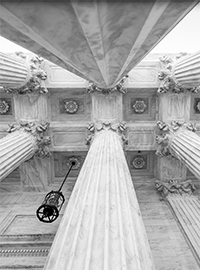| Supreme Court: Unions Accountable for Deliberate Destruction |
 |
|
By Timothy H. Lee
Thursday, June 08 2023 |
Should labor unions possess immunity to deliberately destroy employer property under the claim that such behavior was "incidental to a strike arguably protected by federal law?" The fact that it remained an open legal question illustrates just how egregiously contemporary labor law favors unions. After all, imagine the uproar if employers claimed a reciprocal right to destroy labor union property with impunity. Nevertheless, that was the issue before the United States Supreme Court this term in Glacier Northwest v. International Brotherhood of Teamsters Local 174. Further illustrating the imbalance in existing law, the trial court and Washington state supreme court actually sided with the union and dismissed the case. The U.S. Supreme Court, however, rejected such blanket immunity for unions engaging in deliberate sabotage, scoring another judicial victory for common-sense justice and rule of law. To recite the underlying facts of the case demonstrates the radical sense of entitlement today’s labor leaders possess in pursuing their agenda. Glacier Northwest, the plaintiff employer in the case, sells ready-mix concrete to customers in the state of Washington. Because concrete is highly perishable and begins to harden immediately once it comes to rest, it is shipped in trucks with rotating drums, but even that preserves the concrete for a limited time. As the Court observed, “In this business, time is of the essence.” When Glacier’s collective bargaining agreement with the International Brotherhood of Teamsters expired in August 2017, chaos ensued. The union commenced its work stoppage when it knew that Glacier employees were mixing concrete, loading it into trucks and departing for delivery. Several drivers who had already left for delivery returned with full trucks, parked them and abandoned them without alerting anyone. At that point, Glacier couldn’t maintain the mixed concrete in the trucks because it would harden and ruin the vehicles. Neither, however, could the company simply dump the concrete to save the trucks because of environmentally sensitive chemicals in its mixture. Adding to the emergency, the company didn’t know which trucks contained full loads, how close the concrete was to hardening or where to dump the hardening mixture in a legal manner. At the end of the ordeal, Glacier suffered significant monetary damages and sued the union for recovery due to its deliberate actions. After noting that the National Labor Relations Act (NLRA) does not immunize union workers who fail to take “reasonable precautions” to protect employer property from “foreseeable, aggravated, and imminent danger due to the sudden cessation of work,” the Court majority explained why the union must be held accountable for its conduct: [G]iven the lifespan of wet concrete, Glacier could not batch it until a truck was ready to take it. So by reporting for duty and pretending as if they would deliver the concrete, the drivers prompted the creation of the perishable product. Then, they waited to walk off the job until the concrete was mixed and poured into the trucks. In so doing, they not only destroyed the concrete but also put Glacier’s trucks in harm’s way. This case therefore involves much more than “a work stoppage at a time when the loss of perishable products is foreseeable.” Because the union’s egregious conduct created the emergency at issue, the Supreme Court justly ruled that it can be held accountable. In so doing, the Court continued its trend of incrementally restoring fairness to our nation’s labor laws. In recent years, it has also protected workers from having their wages involuntarily taken by union bosses for political activity, and it overturned a California law forcing employers to allow union organizers onto their property for recruiting purposes. It’s also worth highlighting that the latest ruling comes at a time in which U.S. unionization rates have reached a record low. Consequently, unions resort to increasingly extreme efforts to retain members and extract dues for their partisan causes. While we should welcome these Supreme Court rulings and be grateful for the years of effort that led to its current membership, Congress also plays an important role in the effort toward commonsense labor law reform. In that vein, Senator Tim Scott (R – South Carolina) has introduced the Employee Rights Act with CFIF’s support. Among other provisions, the Act would protect secret ballots in union elections, allow employees to prevent disclosure of their personal contact information to union bosses, require employee consent before their dues could be used for union political purposes, allow workers to maintain independent contractor status if they choose and protect small businesses and franchisees from excessive union pressure. Accordingly, Senator Scott’s proposal can continue the important progress achieved in recent years by the Supreme Court. Cumulatively, these efforts can restore a more level playing field to federal labor-management law and promote American economic competitiveness in today’s challenging global economy. |
Related Articles : |
























